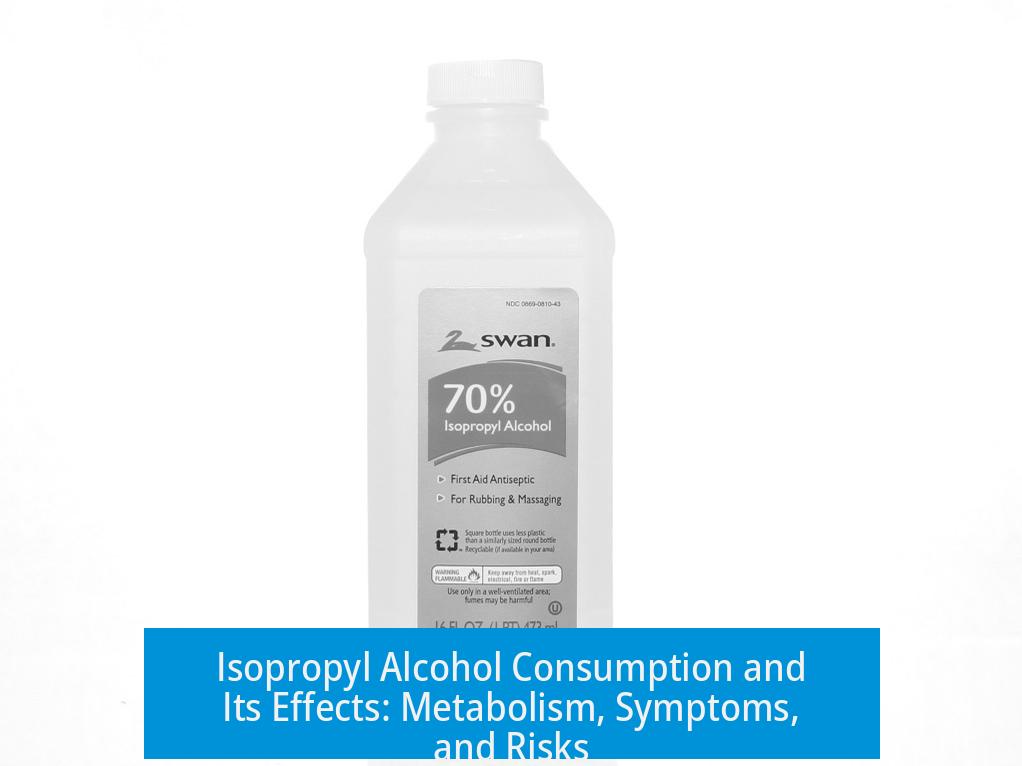Isopropyl Alcohol Consumption: What Are the Effects?
Isopropyl alcohol consumption causes intoxication similar to ethanol but with more severe toxicity and prolonged central nervous system (CNS) depression due to its metabolite acetone. It can induce nausea, vomiting, headaches, internal bleeding, and severe gastric disturbances. The risks outweigh any intoxicating effects, making ingestion dangerous and inadvisable.
1. Metabolism and Toxicity
Isopropyl alcohol, when ingested, is metabolized primarily by alcohol dehydrogenase into acetone. This metabolic process differentiates it from ethanol and methanol, leading to distinct effects and toxicity profiles. The acetone remains in the bloodstream for an extended period, prolonging CNS depression beyond the initial alcohol effects.
Acetone can further degrade into formic acid and acetic acid, which—if produced in significant amounts—might cause metabolic acidosis. Overall, isopropanol toxicity ranks lower than methanol but is more toxic than ethanol.
| Alcohol Type | Relative Toxicity | Main Toxic Metabolite |
|---|---|---|
| Ethanol | Lowest | Acetaldehyde |
| Isopropyl Alcohol | Moderate | Acetone |
| Methanol | Highest | Formic Acid |
Ingesting approximately three ounces (~90 mL) of isopropyl alcohol can be lethal. The substance causes severe gastric irritation and internal damage, posing serious health risks.
2. Intoxication Effects
Isopropyl alcohol produces intoxication, but its subjective effects differ significantly from ethanol. The “buzz” is often described as less euphoric and more nauseating. Initial dizziness and a spinning sensation often precede vomiting.
- Small amounts can induce slight tipsiness but quickly cause discomfort.
- The intoxication tends to be more unpleasant, with nausea and headaches reported.
- Compared to ethanol’s “high,” the sensation is described as harsh and burning.
Personal accounts describe burning sensations in the throat, a sweet but unpleasant taste, and severe hangovers. One individual reported getting drunk from just two sips, emphasizing the potency for some users. The hangover effects are often described as extreme compared to ethanol, including intense headaches and nausea.
3. Physical and Neurological Symptoms
Physically, isopropyl alcohol leads to central nervous system depression that can be prolonged by acetone. Users report symptoms such as severe dizziness, blurred vision, and heightened sensitivity to light.
Common neurological symptoms include:
- Slurred speech
- Weakness and fatigue
- Confusion and cognitive fog
- Blackouts even after small doses
Severe cases may involve seizures and behavioral disturbances, including aggression and psychotic-like episodes. There are documented instances where repeated use resulted in trauma to others and the need for psychiatric intervention.
4. Gastric and Internal Damage
Isopropyl alcohol is caustic to the gastrointestinal tract. Ingesting it frequently causes vomiting, often accompanied by gastric bleeding.
One report detailed vomiting blood and experiencing coffee-ground emesis, which indicates internal bleeding and stomach lining damage. The illness can be severe, with prolonged inability to eat and extreme weakness lasting days to weeks.
Long-term consequences include the development of aversions to alcohol due to trauma and gastrointestinal sensitivity. Even the smell of alcohol can trigger gag reflexes and nausea afterward, showing lasting internal damage.
5. Practical Considerations and Anecdotal Evidence
Some individuals dilute 99% isopropyl alcohol with water or soda to create a drinkable solution, but this practice is medically unsafe. Food-grade isopropanol exists and is used in non-consumable products such as edible paint mixtures, with the assumption that most evaporates during drying. However, drinking isopropanol is never recommended.
Accidental ingestion of isopropyl alcohol, such as through hand sanitizer, can cause severe health events like acute pancreatitis. Alcoholics sometimes consume it when other alcoholic beverages are unavailable, increasing the risk of poisoning.
Inhalation of isopropanol vapors may cause blurred vision, dizziness, and disorientation. These effects highlight potential harm even without ingestion.
Summary of Key Effects and Risks
- Toxicity: Moderate toxicity; metabolized to acetone causing prolonged CNS depression.
- Intoxication: Produces dizziness and nausea more than euphoria; short-term buzz with unpleasant sensations.
- Neurological symptoms: Headache, blurred vision, blackouts, seizures, behavioral disturbances.
- Gastrointestinal harm: Severe gastric irritation, vomiting blood, internal bleeding, and long-lasting damage.
- Fatal dose: Around 90 mL is potentially lethal.
- Advisory: Drinking isopropyl alcohol is unsafe; there are no safe consumption levels.
What symptoms occur after ingesting isopropyl alcohol?
Symptoms include nausea, vomiting, headache, dizziness, and blurred vision. Extended central nervous system depression can cause weakness, slurred speech, and confusion. Severe cases may lead to blackouts or seizures.
How does isopropyl alcohol intoxication differ from drinking ethanol?
It can cause a less euphoric ‘buzz’ and more nausea. The intoxication lasts longer due to the metabolite acetone in the bloodstream, often leading to headache and vomiting rather than pleasant effects.
Can small amounts of isopropyl alcohol cause serious harm?
Yes. Even tiny doses may cause stomach upset or dizziness. Larger or repeated consumption can cause severe gastric bleeding and metabolic acidosis due to acid metabolites.
Is it true that 3 ounces of isopropyl alcohol can be lethal?
Yes. Consuming around 3 ounces can be fatal. The toxic effects come from both the alcohol and its acetone breakdown products disrupting vital body functions.
Are there any long-term effects after surviving isopropyl alcohol poisoning?
Many survivors experience prolonged nausea and aversion to alcohol. Severe cases may lead to digestive damage, memory loss, or psychological trauma from behavioral changes during intoxication.





Leave a Comment